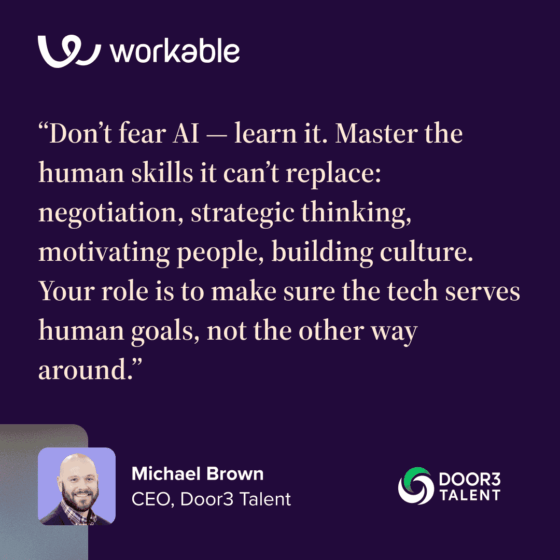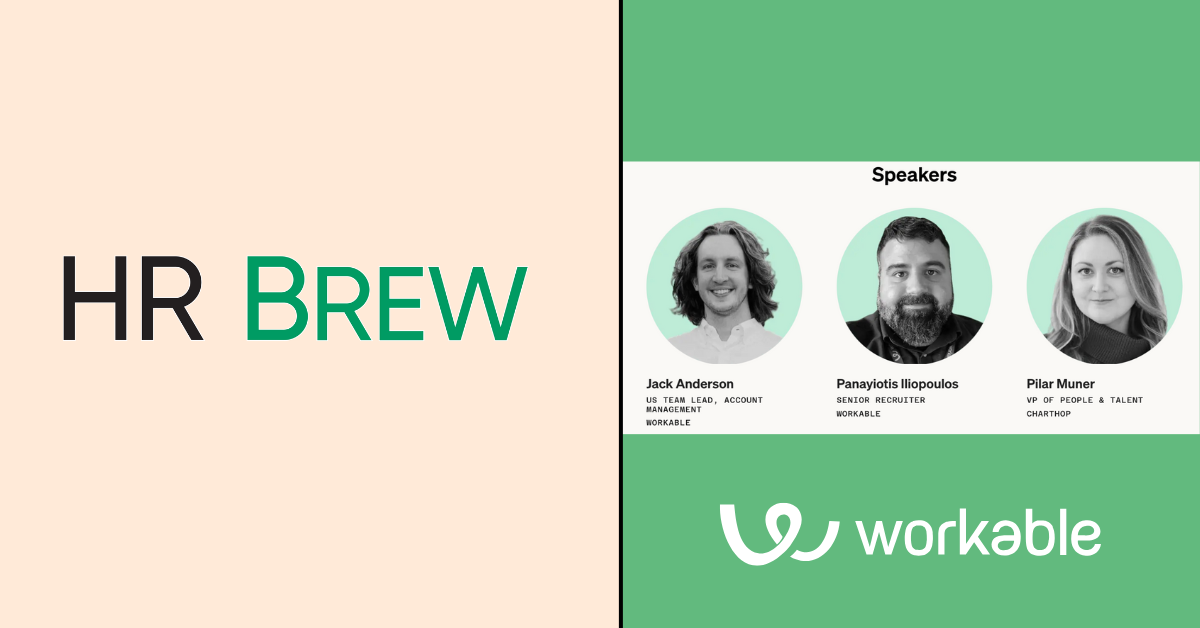AI as a Recruiting Assistant, Not a Replacement
Workplace expert Michael Brown, CEO of Door3 Talent, shares his perspective on balancing AI technology and human judgment in the evolving world of recruiting.

The world of hiring is changing fast. With headlines shouting that “AI will take your job” and startups promising “fully automated recruiting,” it’s easy to get caught in the hype cycle. But Michael Brown, CEO and Founder of Door3 Talent, has a different take: no matter how powerful AI becomes, great hiring will always be human at its core. The best recruiters use AI as an assistant, never a replacement.
Brown, who’s spent two decades scaling teams at companies like Toast, Snyk, Acquia, and Lumafield, has built his career on the idea that people, not processes, close great hires. Now, through Door3 Talent, he helps startups and scaling teams make AI work for them, not instead of them.
We sat down with Brown to explore what it really means to ingrain AI into recruiting processes, where companies are missing the mark, when it’s time to dial back automation in favor of human judgment, and what that means for the future of hiring.
Q: What’s the current state of AI in recruiting today?
“AI in recruiting today is like power steering — helpful, but you still need a driver,” Brown says. “Right now, it’s all about efficiency and speed. Most tools are focused on repetitive work like sorting resumes, scheduling interviews, drafting comms, or simple outreach.”
This is the sweet spot for now. Where companies go wrong, Brown adds, is in over-reliance or neglect. “Over-reliance is trusting the tech too much without understanding its limits or the data it’s trained on. Neglect is skipping strategy and jumping straight to tools. When that happens, teams tinker without training, adoption stalls, and investments get wasted.”
Q: How can recruiters make AI their biggest advantage?
“The key is discipline,” Brown says. “Start small, experiment intentionally, and measure outcomes instead of chasing every shiny tool.”
He suggests focusing AI where it delivers the most value:
- Resume screening: Let AI handle the initial filtering and scoring so recruiters can focus on making judgment calls.
- Personalized outreach: Use AI to analyze candidate profiles and craft messages that feel authentic, not templated.
- Scheduling automation: Offload the endless back-and-forth that eats hours every week.
Q: Where should leaders draw the line on what AI should and shouldn’t do?
“AI should never be judge, jury, and executioner in hiring,” Brown says firmly. “Hiring is about humans. AI can score candidates brilliantly, but it should never decide who gets a future.”
He explains that the danger lies in removing human oversight. “If AI screens people out automatically and no one reviews it, you risk bias and unfairness. Human auditing and review have to be non-negotiable.”
Q: How do you decide which tasks belong to AI and which to humans?
Brown uses two frameworks to help teams make that call:
- Repeatability vs. Nuance
“If a task is highly repeatable, predictable, and low in emotional judgment, like scheduling or data extraction, it’s perfect for automation. If it requires empathy or complex decision-making, it stays human.” - Automate → Augment → Advise
“Early on, we use AI to automate repetitive work. As we mature, we augment human performance with context and creativity. At the highest level, AI advises — it offers insights that shape decisions, but it never replaces the human call.”
Together, he says, these frameworks keep teams focused on efficiency without losing empathy.
Q: Once recruiters get time back from AI, where should they reinvest it?
“AI frees the hands so recruiters can use their heads,” Brown says. “With more time, recruiters should reinvest in what really matters — building relationships, understanding markets, and creating experiences that attract top talent.”
For HR leaders, he adds, the focus should shift toward strategic workforce planning, future skill mapping, and AI auditing.
“Efficiency is just the start. The real ROI is better judgment and stronger teams.”
Q: What are the biggest mistakes recruiters make with AI?
“Neglecting change management is the biggest mistake,” Brown warns. “Bringing in AI isn’t just installing software — it’s changing how people work, think, and interact.”
He says too many leaders skip strategy and go straight to tools. “When recruiters don’t understand why AI is there, or feel threatened by it, they resist. But when they see AI as a partner that amplifies their value, that’s when transformation begins.”
Q: Does AI adoption look different for startups versus enterprises?
“Absolutely,” Brown says. “Startups need agility — lightweight tools that solve their biggest bottlenecks like sourcing or scheduling. Ease of use matters more than depth. Enterprises move slower but can invest in deeper integrations and governance.”
He adds a word of caution: “Midsize companies often overreach — they jump to big platforms before they’ve nailed the basics.”
Q: Where is AI in recruiting headed next?
“The big shift coming is from automation to prediction,” Brown says. “AI will connect recruiting to broader talent management — forecasting future skill needs and hiring proactively. The more AI handles, the more valuable human strategy and empathy become.”
His advice for recruiters and HR leaders:
“Don’t fear AI — learn it. Master the human skills it can’t replace: negotiation, strategic thinking, motivating people, building culture. Your role is to make sure the tech serves human goals, not the other way around.”

The Takeaway
AI is reshaping recruiting, but how it reshapes it is a choice. Some teams may over-rely on it, while those that get it right will use it to empower their people. The real advantage comes from using AI smartly, to streamline work without losing the human connection at the core of hiring. There’s no denying AI is revolutionary and changing the game, but it still needs to be thoughtfully integrated.
As Brown puts it, “the more AI handles, the more valuable human strategy and empathy become.”




